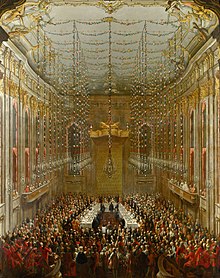Supper
| Part of a series on |
| Meals |
|---|
 |
| Meals |
| Components and courses |
| Related concepts |
This article needs additional citations for verification. (January 2007) |
Supper is the main evening meal or can be used to describe a light snack later in the evening.
Etymology
The term is derived from the French souper, which is used for this meal in Canadian French, Swiss French, and sometimes in Belgian French. It is related to soup. It is also related to the Scandinavian and German word for soup, Suppe. The Oxford English Dictionary, however, suggests that the root, sup, remains obscure in origin.[1]
Usage

The distinction between dinner and supper was common in United States farming communities into the twentieth century. In most parts of the United States and Canada today, "supper" and "dinner" are considered synonyms. In Saskatchewan, and much of Atlantic Canada, "supper" means the main meal of the day, usually served in the late afternoon, while "dinner" is served around noon. "Dinner" is used in some areas, such as Newfoundland and Labrador, to describe the noon meal as well as special meals, such as "Thanksgiving dinner", "flipper dinner" or "Christmas dinner," the evening meal being "supper." The word "supper" is also regionally reserved for harvest meals put on by churches and other community organizations: "fowl suppers" or "fall suppers" (featuring turkey) are common in Canada; "pancake suppers" given by church groups are common in the United States; and "bean suppers" (featuring baked beans) are common in New England and especially the state of Maine.[3] In addition, the term "supper" is most frequently used in Atlantic Canada.[citation needed]
Supper may refer to, on largely class-based distinctions, either a late-evening snack (working and middle class usage) or else to make a distinction between "supper" as an informal family meal (which would be eaten in the kitchen or family dining room) as opposed to "dinner", a generally grander affair (either or both in terms of the meal and the courses within the meal itself), which would be eaten in the best dining room, could well have guests from outside the household, and for which there might be a dress code.[4] It is common for social interest and hobby clubs that meet in the evening after normal dinner hours to announce that "a light supper" will be served after the main business of the meeting. Supper can also refer to the largest meal of the day.[citation needed]
In England and much of Canada, whereas “dinner,” when used for the evening meal, is fairly formal, “supper” is used to describe a less formal, simpler family meal. In some areas of the United Kingdom, "supper" is used to describe an evening meal when dinner has been eaten around noon. In some northern British and some Australian homes, as in New Zealand and Ireland, "tea" is used for the evening meal. In parts of the United Kingdom, supper is a term for a snack eaten after the evening meal and before bed, usually consisting of a warm, milky drink and British biscuits or cereal, but can include sandwiches.[citation needed]
In the United Kingdom, in traditional fast food take-away fish and chip shops, it is common to refer to an item served with a side (or more usually on top of) chips as a "supper", regardless of when it is served. For example, fish served with chips would be a "fish supper", or a sausage served with chips would be a "sausage supper". The term is in such common usage that it is necessary to qualify items ordered without chips as a "single", for example a "sausage single".
In New Zealand it is similar, generally referring to cake and tea or coffee served later in the evening, particularly when people have visitors.[citation needed]
In Chinese food, the xiaoye (宵夜) is a late night supper or small meal, often translated into English as "supper". Many Chinese restaurants serve a special menu for xiaoye, including simpler items such as congee or soup noodles.[citation needed] Xiaoye may also be eaten at a night market, where small meals or substantial snacks known as xiaochi are commonly served.[citation needed] The xiaoye is a fourth meal commonly consumed by a person whose lifestyle or schedule requires staying awake late into the night, many hours after the normal evening meal; for example, a shift worker or an attendee at a night concert.[citation needed]
See also
References
- ^ "Oxford English Dictionary". Oxford University Press. Retrieved May 17, 2012.
- ^ "Wedding Supper". www.google.com. Retrieved 2015.
{{cite web}}: Check date values in:|accessdate=(help) - ^ "Research – Foodways Research: A Taste of Maine". The University of Maine Folklife Center. Retrieved September 8, 2013.
- ^ Post, Emily (1945). Etiquette: the blue book of social usage (10th ed.). Funk & Wagnalls. p. 375.
